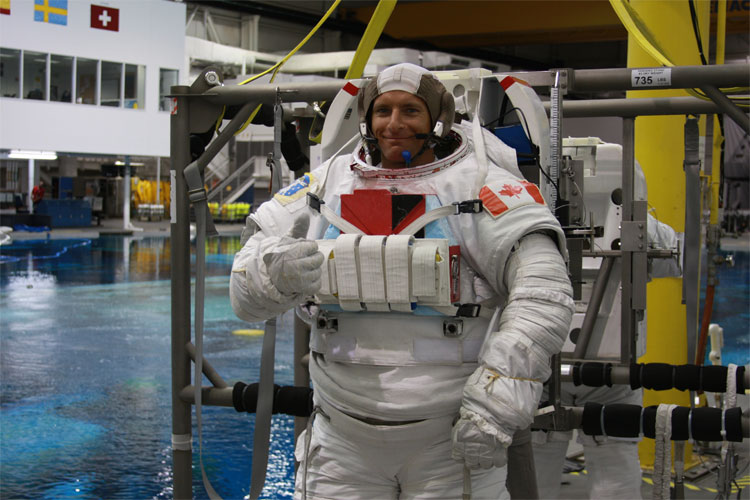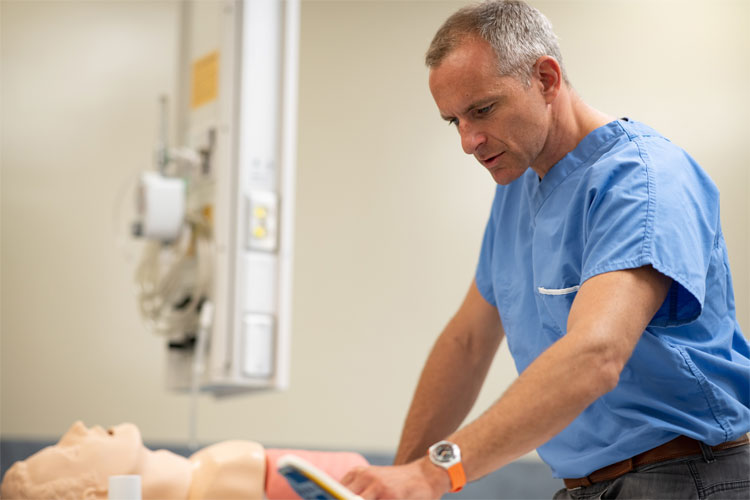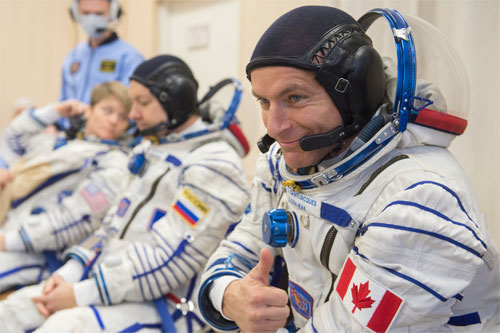Date of birth: January 6, 1970
Born: Saint-Lambert, Quebec, Canada
Motto: Anything worth doing is worth doing right
Pastimes: David is a lifelong mountaineer, cyclist, skier and avid sailor
Background: Engineer, astrophysicist, family doctor
Flight certification: Commercial pilot license with multi-engine and instrument ratings
Education: Bachelor of engineering in engineering physics; Ph.D. in astrophysics; medical degree
Languages: French and English, and basic Russian, Spanish and Japanese
Mission: Expedition 58
- Personal Data: Born on January 6, 1970, in Quebec City, Canada, and raised in Saint-Lambert near Montreal, Canada. He is married and has three children. He is a lifelong mountaineer, cyclist, skier and avid sailor. He also holds a commercial pilot licence with multi-engine and instrument ratings and an advanced scuba-diving licence. Saint-Jacques is fluent in English and French and can also converse in Russian, Spanish and Japanese.
- Education: Saint-Jacques earned a bachelor of engineering in engineering physics from École polytechnique de Montréal, Canada (1993). He earned a Ph.D. in astrophysics from Cambridge University, UK (1998). He earned his M.D. from Université Laval in Quebec City, Canada (2005), and completed his family medicine residency at McGill University in Montreal, Canada (2007), where his training focused on first-line, isolated medical practice.
- Organizations: Collège des médecins du Québec, College of Family Physicians of Canada, Ordre des ingénieurs du Québec, International Society for Optics and Photonics, Life Fellow of the Cambridge Philosophical Society, Aerospace Medical Association, Wilderness Medical Society.
- Special Honours: Royal Canadian Geographical Society Gold Medal (2014), Médaille d'honneur de l'Assemblée nationale du Québec (2013), Canada Millennium Scholarship (2001 to 2005), Japan Society for the Promotion of Science Post-doctoral Fellowship (1999 to 2001), Natural Sciences and Engineering Research Council of Canada "1967" Science and Engineering Scholarship (1994 to 1998), Canadian Space Agency Supplement Scholarship (1994 to 1998), Cambridge Commonwealth Trust Honorary Scholar (1994 to 1998), United Kingdom Overseas Research Student Award (1994 to 1998), Canada Scholarship (1989 to 1993).
Meet David

2010-08-24 Attired in a training version of his Extravehicular Mobility Unit (EMU) spacesuit, CSA astronaut David Saint-Jacques is getting ready to be submerged in the waters of the Neutral Buoyancy Laboratory (NBL) at NASA’s Johnson Space Center for spacewalk training. (Credit: NASA)
Prior to joining the Canadian Space Program, Saint-Jacques was a medical doctor and the Co-chief of Medicine at Inuulitsivik Health Centre in Puvirnituq, Nunavik, an Inuit community on Hudson Bay. He is an Adjunct Professor of Family Medicine at McGill University and also worked as a Clinical Faculty Lecturer for the university’s Faculty of Medicine, supervising medical trainees in Nunavik. Saint-Jacques began his career as a biomedical engineer, working on the design of radiological equipment for angiography at Lariboisière Hospital in Paris, France. During his graduate studies in astrophysics he developed adaptive optics and interferometry systems for the Cambridge Optical Aperture Synthesis Telescope and the William Hershel Telescope in the Canary Islands. His postdoctoral research included the development of the Mitaka infrared interferometer array in Japan and the Subaru telescope adaptive optics system in Hawaii (1999 to 2001), after which he joined the Astrophysics group at Université de Montréal. His international experience also includes engineering study and work in France and Hungary and medical training in Lebanon and Guatemala.
Astronaut Experience:
Saint-Jacques was selected in May 2009 by the Canadian Space Agency (CSA) and moved to Houston to be one of 14 members of the 20th NASA astronaut class. In 2011, he graduated from Astronaut Candidate Training, which included International Space Station (ISS) systems and procedures, spacewalks, robotics, T38-N flight training, field geology training, Russian language, and wilderness summer, winter and water survival training.
Since graduation, he has been continuously training to maintain his skills as well as taking part in various geology, glaciology, speleology and other scientific expeditions such as the underwater NEEMO 15 mission and the underground CAVES 2013 mission.
Saint-Jacques supports the space program through his work with NASA and the CSA, and routinely shares his passion for science, technology, engineering and mathematics (STEM) with young Canadians. After completion of basic training, he was first assigned to the Robotics Branch of the NASA Astronaut Office, then successively acted as Support Astronaut for ISS Expedition 35/36; Lead Capsule Communicator (or Capcom, the Mission Control space-to-ground radio operator) for ISS Expedition 38; Deputy Capcom for Cygnus-1 and Cygnus-2 ISS resupply missions; and Lead Capcom for the Cygnus-3, Cygnus-4 and SpaceX-6 ISS resupply missions. He recently acted as a Capcom instructor and supported the Visiting Vehicle Operations in the ISS Integration Branch.
In May 2016, the Honourable Navdeep Bains, Minister of Innovation, Science and Economic Development and Minister responsible for the Canadian Space Agency, announced that Canadian astronaut David Saint-Jacques has been assigned to Expedition 58. Since August 2016, David has been training in Canada, Russia, the United States, Europe and Japan, where he is honing his skills and knowledge on the International Space Station, the Soyuz spacecraft, and a variety of mission-specific tasks.
Q&A
SPACE AND EXPLORATION
Why did you want to become an astronaut?
As a child, I was impressed by photos of Earth taken from the moon. They showed me the immensity of the universe around us, the splendour and obvious fragility of our planet. Growing up, I was drawn to a life of adventure, exploration and discovery. I didn’t think that becoming an astronaut was a real possibility, but my fascination with space remained, and that childhood dream has motivated me to reach my full potential as a human being. I wanted to learn everything, both about the sciences and world cultures. To be an explorer, I also had to become a responsible and trustworthy adult. Opportunities for discovery have presented themselves in many forms: science, medicine, living abroad. When I learned one day that astronauts were being recruited, the dream returned, and the little boy I once was convinced me to apply.

2018-08-31 David Saint-Jacques takes a course on advanced trauma life support at the Steinberg Centre for Simulation and Interactive Learning. (Credit: Université McGill/Terrie Quilatan)
WORK AND STUDIES
What motivated you to study in your fields?
To understand: that is my main motivation. This fundamental need has guided my academic and career path. I’ve always wanted to get to the bottom of things, and go beyond books and theory. I’m naturally curious and drawn by discovery and adventure.
Like my father and grandfather, I started by studying engineering—I wanted to know “how things worked”! I always wear my engineer’s ring proudly.
Next I studied astrophysics to understand the universe: Where do we come from? What lies deep in the night sky?
After about 10 years of study and working abroad, my interests had evolved and I wanted to return to Quebec to play a more direct social role. I took up medicine in order to better understand the human being.
What was your previous job?
I was a family physician at the Inuulitsivik health centre in Puvirnituq, an Inuit community on the shores of Hudson Bay. I was also a clinical lecturer for McGill University and supervised student and resident interns in Nunavik.
Before becoming a physician, I worked as an astrophysicist in Cambridge, United Kingdom; in Tokyo, Japan; at the Mauna Kea Observatory in Hawaii; and with the astrophysics group at the University of Montreal.
Before becoming an astrophysicist, while working as an engineer for a small business in Quebec, I was involved in designing radiology equipment for angiography at the Lariboisière hospital in Paris, France
What did you like best about your job and how has it prepared you for a career as astronaut?
Each in their own way, the professions I have practised have prepared me well to go into space.
Practising medicine in isolated regions is a team affair, where you have to solve complex problems with limited resources. As in the field of space exploration, everyone is enthusiastically dedicated to their work: first responders, doctors, nurses, air ambulance pilots. You learn to work together and trust each other, to the point that you have no hesitation about putting your life in your colleagues’ hands.
My years as an astrophysicist taught me the discipline of research and the joy of scientific discovery as I worked in observatories the world over, part of international teams determined to push the boundaries of knowledge.
As an engineer, I especially enjoy the creativity and the satisfaction of finding a solution to a practical problem that is so elegant, so reliable and so ergonomic that in the end you take it for granted. When an engineer has done their job well, it works, and that’s all there is to it!
Finally, whether in Nunavik, Japan, England or France, I have lived in communities where the culture was different from mine. This has taught me to step back, to observe, to question myself and to become more adaptable.
What do you consider your greatest achievement?
Raising my three children, and succeeding in being a good husband and good father despite the elevated demands of my work and the compromises and sacrifices it involves. This requires real teamwork with my wife. Like me, she juggles child care and a demanding career, all while living as an expatriate. This balancing act is made possible thanks to her energy, her creativity and her sense of humour. I am nourished by my family life – it keeps my feet on the ground!
ADVICE AND INSPIRATION
What is the best career advice you’ve ever received?
As a young student, I had the chance to meet astronaut Steve MacLean when he came to speak at my university. I told him of my passion for space and my curiosity about his work. He gave me some very simple advice: don’t try to build your career path solely around the goal of becoming an astronaut. First and foremost, make choices that will make you happy. That way you will be happy, wherever life takes you!
I have followed his advice. I understand that dreams are important because they provide a direction, but not necessarily a destination. We have to cherish our dreams and let ourselves be guided by our ideals, while remaining open to the opportunities that arise along the way. Above all, don’t consider yourself a failure if you end up someplace other than where you expected. If every step is a positive experience, then the end result will be the right one.
Think back to a teacher who had a positive impact on your life. What did she/he do to influence you?
The director of my doctoral thesis, the late Professor John Baldwin. He was a sort of second father to me. Over and above his scientific mind, his intellectual creativity and his hardworking nature, he was an exceptionally generous man who was attentive to others. He saw his team of students, technicians and support staff as people, not numbers. As a leader, he naturally felt responsible for their professional success, but also in part for their personal well-being. His team was like a family, and each member had everyone’s interests at heart and was unsparing in their efforts.
Which living person do you most admire? Or Who are your heroes in real life?
I have always been impressed by those who have to face extreme adversity – serious disease, war, disaster – and manage to remain serene through it all. I sincerely admire those who demonstrate resilience, who find meaning in their lives in spite of all the meaninglessness that may confront them. To stay happy is something truly heroic.
PERSONAL TASTES AND FAVORITES
What is your favourite sci-fi movie?
I must admit I’ve never been a big fan of science fiction, possibly because I find reality interesting enough on its own! On the theme of space, I prefer documentaries, especially those that deal with the human aspect of space exploration. I particularly like Al Reinert’s For All Mankind, which is visually mind-boggling. The director plunges us into the Apollo program, without making it a history lesson and without focusing on names, dates or technical details, but rather on the meaning, the rationale, the emotions.
What is your favourite book?
Terre des hommes [translated into English as Wind, Sand and Stars] by Antoine de Saint-Exupéry. I read it very young—my mother gave it to me, knowing my interests full well—and I have reread it a few times since. The images the author evokes of adventure and exploration, his love for our beautiful planet and its inhabitants, and his philosophical reflections on life, friendship and death have stayed with me to this day.
What is your favourite place on Earth?
The area around Round Top Mountain, in Sutton. My father took me there backcountry skiing, when I must have been about 10 years old. It was my first excursion off the beaten path: trees heavy with snow, the muffled silence of the forest, the trail you had to make for yourself—they made a lasting impression on me. The boldness, the freedom, the unknown. I discovered the adventurer, the explorer in me. I go back there whenever I can. I can still feel the sense of wonder, of mystery, even though I now know every corner of the Sutton forest by heart.
What is your most treasured possession?
When I was a teenager my bicycle was stolen—the bike I had outfitted, adjusted, repaired over the years, the bike that had gone with me on my adventures. I was devastated; I went through a kind of mourning. That was the end of treasures for me. During my studies abroad (10 years of my life), all my possessions could fit into a single suitcase. I attribute far more value to my relationships with others, to experiences and to education. I’m wary of possessions and of the comfort they give us—there’s too much risk of becoming complacent!

2018-11-20 As a member of the prime crew, David Saint-Jacques and his crewmates, Oleg Kononenko (Roscosmos) and Anne McClain (NASA), take part in pre-launch activities.



